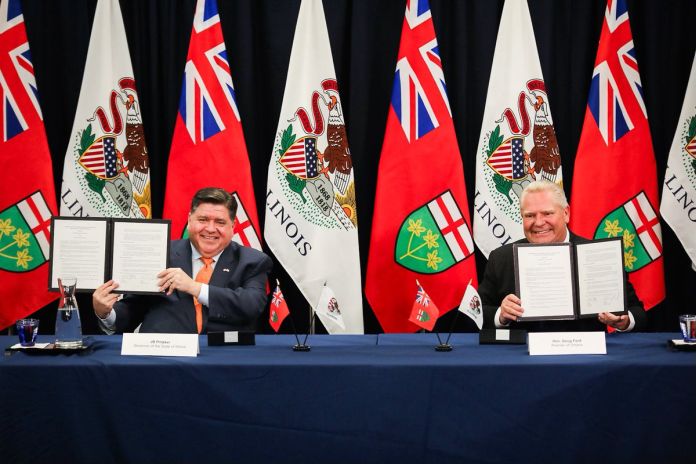TORONTO, Canada – Ontario and Illinois finalized a new Memorandum of Understanding (MOU) to promote increased trade, attract investment and foster ongoing collaboration across key sectors such as automotive, agriculture, energy and advanced manufacturing. The MOU was signed by premier Doug Ford and J.B. Pritzker, Governor of Illinois, following a meeting in Toronto.
“Strengthening our ties with important trading partners like Illinois is part of our plan to rebuild Ontario’s economy,” said premier Ford. “As we attract game-changing investments in our economy, it has never been more important for us to develop and deepen our relationships with other like-minded jurisdictions. This agreement, along with the others we’ve signed with US states, is going to help boost trade, attract investments and create better jobs with bigger pay cheques on both sides of the border.”
“Building on our firm trade relationship and shared value set, this Memorandum of Understanding is an opportunity to further solidify the economic and cultural bond between Illinois and Ontario,” said Governor JB Pritzker. “Deepening those ties will help each of our respective governments create jobs and opportunity for our people, drive long-term growth and meet the challenges of the coming years.”
Ontario and Illinois have a close trading relationship, with total trade valued at over $29 billion (CAD) in 2023. Ontario is Illinois’ second-largest export market and Illinois is Ontario’s fourth-largest export market in the US.
The new MOU promotes economic cooperation between the two jurisdictions by supporting regular business missions, sharing market information and promoting investment. Ontario and Illinois will also explore opportunities for cooperation on emerging technologies that are transforming industries, including sharing best practices on skills training to prepare workers for in-demand and technology-intensive jobs.
In addition, both jurisdictions will establish a Procurement Cooperation Council as a forum for sharing information on procurement policies and to advance opportunities for suppliers in each jurisdiction.
“With supply chains inter-linked across North America, it’s more important than ever for Ontario and Illinois to partner on our shared economic goals to remain globally competitive,” said Vic Fedeli, Ontario’s minister of economic development, job creation and Trade. “The MOU identifies tangible areas where we can work together to our mutual advantage. These include fostering greater two-way trade and investment, sharing best practices to boost workforce skills and expanding academic cooperation – all avenues to greater prosperity on both sides of the border.”
The agreement with Illinois is part of Ontario’s strategy for trade with the United States. As part of the strategy, Ontario is pursuing additional agreements with other state-level trading partners to improve access to investment pipelines and export opportunities for Ontario businesses.
Ontario and the US build things together with deeply integrated supply chains employing millions of workers on both sides of the border. Ontario was the number one export destination for 17 US states and the number two export destination for 11 US states in 2023.
Quick facts
The new MOU will increase collaboration in sectors such as automotive, including electric, connected and autonomous technologies, agriculture, food processing and agri-food technology, advanced manufacturing and materials, life sciences, energy and information and communications technologies.
Ontario’s total trade with the U.S. in 2023 was valued at around $500 billion (CAD), an increase of about $100 billion (CAD) since 2018.
In 2023, Illinois ranked fifth in terms of foreign direct investment from US states into the province, with inbound investment valued at $155 million (CAD).
One in five jobs in Ontario depends on trade. If Ontario were a country, it would be the US’s third-largest trading partner after Mexico and China in 2023.
The signing with Illinois is the fourth agreement stemming from Ontario’s US trade strategy and follows agreements signed with Michigan, Nevada and Indiana.





